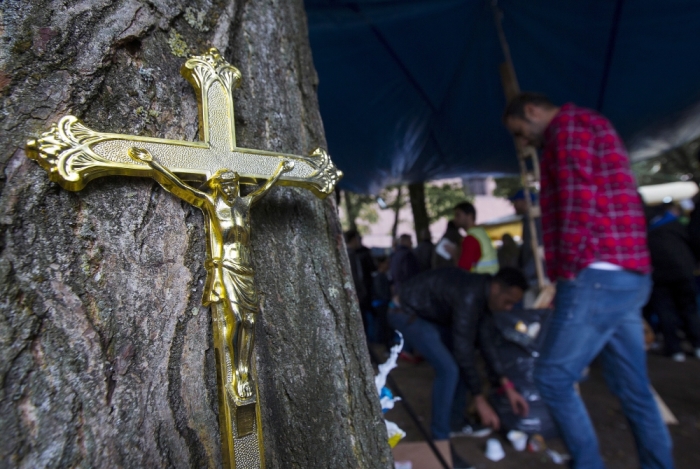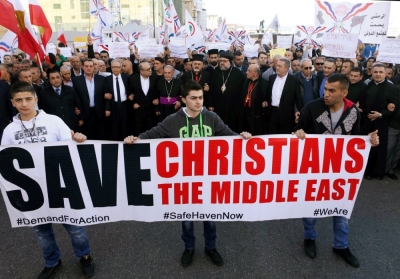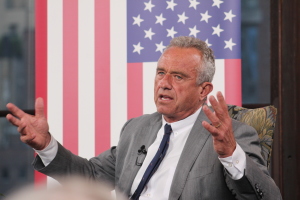Pastor Ronnie Floyd Calls on Christians to Help Refugees Ahead of 'Stand With the Persecuted' Sunday

As Christian persecution across the globe reaches levels never before seen, churches throughout the U.S. will devote time during Sunday worship services to pray for victims by taking part in "Stand With the Persecuted Sunday."
Eight prominent religious liberty organizations — Open Doors USA, the Institute on Religion & Democracy, The Voice of the Martyrs, In Defense of Christians, Christian Solidarity Worldwide USA, International Christian Concern, 21st Century Wilberforce Initiative and the Family Research Council — are calling on over 40,000 American churches to designate a small portion of their services this weekend to pray for those around the globe that have been persecuted because of their faith in Jesus Christ.
Besides prayer, the initiative also calls on churches to show a brief video highlighting the plight of Christians across the world, distribute a special bulletin insert, participate in practical ministries and promote policy and legislation designed to protect the persecuted.
According to the 2016 Open Doors World Watch List, 2015 proved to be the worst year for Christian persecution the organization has ever recorded. As over 7,000 Christians were killed for their faith, more Christians were killed during Open Doors' 2015 reporting period than any previous reporting period.

"As Christians here in America, we have an obligation to pray for and act on behalf of our brothers and sister in Christ who are being persecuted for their faith," FRC President Tony Perkins said in a statement. "The persecution of Christians is at an unprecedented level and we are even seeing it here in the United States, but the hostility that Christians here in America are facing pales in comparison to the mistreatment, displacement, violence, rape, crucifixions, and beheadings experienced by followers of Jesus in Iraq, Syria, Libya, Pakistan, and other parts of the Middle East and beyond."
A number of churches have already indicated that they will take part in "Stand With the Persecuted Sunday."
Among the churches that have indicated thus far that they will participate in the initiative are the Cross Church megachurch in Arkansas headed by Southern Baptist Convention President Ronnie Floyd and Skyline Wesleyan Church in San Diego headed by Pastor Jim Garlow.
"I think many churches are aware of the rise of persecution across the globe, but as to praying for them and taking action, calling upon leaders to intervene, this could be improved upon dramatically," Floyd stated in an email to The Christian Post. "Yet, this is why we educate them through Sundays like this."
According to Floyd, standing with the persecuted means to become "their voice for religious liberty" and call "upon national and global leaders to intervene on their behalf."
Floyd said all five of the Cross Church campuses will take part in the initiative, adding that much time was spent praying for the persecuted church at the Southern Baptist Convention's national prayer gathering last year.
Floyd also called on churches to be "prepared to assist" any refugees that come to America.
"We need to love them, meet their needs compassionately, but also be more than faithful to present to them the Good News of the Gospel of Jesus Christ," Floyd stated. "Across the world, I know Southern Baptists are on the front lines of ministering to thousands of refugees. Through our Baptist Global Response efforts and mission efforts internationally, we are very involved in ministering to refugees."
Travis Weber, director of FRC's Center for Religious Liberty, told CP that there are a number of practical ministry opportunities that churches and their congregants should take part in, including donating to ministries that provide aid and assistance to the persecuted, like Franklin Graham's Samaritan's Purse.
"Churches can organize gifts and aid to be sent to persecuted believers in refugee camps in the Middle East and around the world. Our partner organizations also have opportunities on their websites to meet the practical needs of displaced Christians, such as clothing, bedding, and other needs," Weber said. "Churches can also organize believers to write notes of encouragement to believers overseas. We are also encouraging those who can to volunteer their time and actually serve with one of these ministries as a part of their relief efforts."
As part of the initiative calls on churches to promote policies designed to help those facing persecution abroad, it should be noted that as many as half of state governors have indicated in the past that they will block Syrian refugees from being placed in their states.
On a federal level, Sen. Tom Cotton, R-Ark., introduced a bill last month calling on the government to prioritize Christians and other religious minorities in the United States' Syrian refugee resettlement program.
As of April 10, the U.S. has only resettled four Syrian Christian refugees, as opposed to 1,070 Muslim refugees, since the Islamic State's attack in Paris last November. Cotton's bill, if passed into law, would force the government to take in as many as 10,000 Syrian religious minority refugees each year over the next five years.
"The United States unwisely relies on the United Nations for all referrals of refugees seeking resettlement," Cotton said while introducing the bill on the Senate floor. "Christians and other religious minorities fleeing persecution are the victims of unintentional discrimination when seeking asylum and protection in the United States."




























